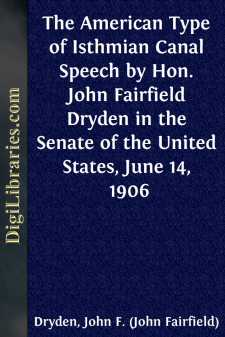Categories
- Antiques & Collectibles 13
- Architecture 36
- Art 48
- Bibles 22
- Biography & Autobiography 813
- Body, Mind & Spirit 142
- Business & Economics 28
- Children's Books 17
- Children's Fiction 14
- Computers 4
- Cooking 94
- Crafts & Hobbies 4
- Drama 346
- Education 46
- Family & Relationships 57
- Fiction 11829
- Games 19
- Gardening 17
- Health & Fitness 34
- History 1377
- House & Home 1
- Humor 147
- Juvenile Fiction 1873
- Juvenile Nonfiction 202
- Language Arts & Disciplines 88
- Law 16
- Literary Collections 686
- Literary Criticism 179
- Mathematics 13
- Medical 41
- Music 40
- Nature 179
- Non-Classifiable 1768
- Performing Arts 7
- Periodicals 1453
- Philosophy 64
- Photography 2
- Poetry 896
- Political Science 203
- Psychology 42
- Reference 154
- Religion 513
- Science 126
- Self-Help 84
- Social Science 81
- Sports & Recreation 34
- Study Aids 3
- Technology & Engineering 59
- Transportation 23
- Travel 463
- True Crime 29
The American Type of Isthmian Canal Speech by Hon. John Fairfield Dryden in the Senate of the United States, June 14, 1906
Categories:
Description:
Excerpt
THE AMERICAN TYPE OF
ISTHMIAN CANAL
It was on June 14, 1906, when the Canal subject was up for final consideration, that Mr. Dryden addressed the Senate. The official records show that "S. 6191, to provide for the construction of a sea-level canal connecting the waters of the Atlantic and Pacific oceans, and the method of construction," was before Congress, and it was in opposition to this measure that Mr. Dryden patriotically pledged his devotion to American enterprise and American ability by declaring for the lock-level type of canal, built by American engineers and under American supervision, concluding with the following words, which deserve to be recalled on this memorable occasion as a tribute to the native genius and enterprise of the American people:
"I am entirely convinced that the judgment and experience of American engineers in favor of a lock canal may be relied upon with entire confidence and that such an enterprise will be brought to a successful termination. I believe that in a national undertaking of this kind, fraught with the gravest possible political and commercial consequences, only the judgment of our own people should govern, for the protection of our own interests, which are primarily at stake. I also prefer to accept the view and convictions of the members of the Isthmian Commission, and of its chief engineer, a man of extraordinary ability and large experience. It is a subject upon which opinions will differ and upon which honest convictions may be widely at variance, but in a question of such surpassing importance to the nation, I, for one, shall side with those who take the American point of view, place their reliance upon American experience, and show their faith in American engineers."
The Panama Canal problem has reached a stage where a decision should be made to fix permanently the type of the waterway, whether it shall be a sea-level or a lock canal. An immense amount of evidence on the subject has in the past and during recent years been presented to Congress. An overwhelming amount of expert opinion has been collected, and an International Board of Consulting Engineers has made a final report to the President, in which experts of the highest standing divide upon the question. The Senate Committee on Interoceanic Canals has likewise divided. It is an issue of transcendent importance, involving the expenditure of an enormous sum of money, and political and commercial consequences of the greatest magnitude, not only to the American people, but to the world at large.
The report of the International Board has been printed and placed before Congress. A critical discussion of the facts and opinion presented by this Board, all more or less of a technical and involved nature, would unduly impose upon the time of the Senate at this late day of the session. In addition, there is the testimony of witnesses called before the Senate committee, which has also been printed in three large volumes, exceeding 3,000 pages of printed matter. To properly separate the evidence for and against one type of canal or the other, to argue upon the facts, which present the greatest conflict of engineering opinion of modern times, would be a mere waste of effort and time, since the evidence and opinions are as far apart and as irreconcilable as the final conclusions themselves....


